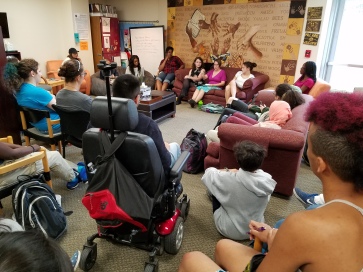Queer (De)Coded, a Roundtable Roundup
The Women’s Center’s Roundtable series is underway! On October 20th, we hosted the second of our three-part roundtable “Our Bodies, Ourselves” series. Queer (De)Coded focused on women and queer coding, deconstructing how women and femme individuals utilize and present their bodies in order to appear more or less queer. Queer coding is when individuals hint with their bodies and mannerisms their identity without explicitly stating their sexuality or gender identity.

For this discussion, we invited staff member Elle Trusz, UMBC alum Juliette Seymour, and community member Melissa Smith to begin the roundtable dialogue with their own thoughts and perspectives related to queer coding. Elle opened up the conversation, discussing what it is like to be in relationships that are read as straight but are actually queer. She explained that walking down the street with her “husbutch”- or female spouse- could sometimes be seen by others as a straight couple based upon how both individuals present themselves.
Juliette also had interesting input into what it is like being a queer person who appears straight and cisgendered within their own life. Juliette discussed how their appearance sometimes made it more possible to be in spaces that may or may not be LGBTQIA+ friendly, yet it also felt like taking a step back into the closet. Melissa brought up the different ways her queer embodiment shows up in her workplace and the critical ways she is being present in all of her identities in order to make more space for others like her.

After initial remarks, the discussion turned to what “queer” looks like, who can present as queer, and the intersections that can emerge when facing different personal identities. The discussion of what it looks like to be queer and privileged identities was brought to the table. Elle discussed her privilege as she recounted instances where her queer identity was more protected based upon her whiteness. Melissa discussed her own identity as a black queer person and how the layers of both these identities can be challenging in our heteronormative, white-centric world. The UMBC Outlist became a part of our discussion and the ways in which this list can also send messages of acceptable or not-acceptable queer presentation on campus and in professional settings in general.
A large portion of the conversation turned to religion and queerness. Melissa spoke very candidly about her own conflicts within religion, and the conversation opened up for the audience. Many people shared their own experiences with religion and their individual queer identities.
Overall, the dialogue we shared with each other as a learning community was deep (and only scratching the surface at the same time) and meaningful and can’t be entirely captured in such a short summary. Thanks to our panel members and participants for making Queer (De)Coded a success and creating a conversation around the many ways we embody queer identities within our daily lives.
Don’t Forget, our last roundtable of the semester,Fatness in Focus, will take place on November 30th, at 4pm in The Women’s Center!
Couldn’t make it to this roundtable? No worries! Here are some resources that further delve into the topic of queer coding and embodied queerness.
Staff member Dan Wiley’s piece on queer hair from the Women’s Center’s Blog
Femme- Butch taught privileges, Everyday Feminism
Comic debunking assumptions about queer femme bodies
Autostraddle article looking at queercrip fashion
Helpful UMBC LGBTQ Online Resources
Student Life’s LGBTQ Resources
UMBC’s LGBTQ Faculty and Staff Association
Posted: October 25, 2016, 9:00 AM